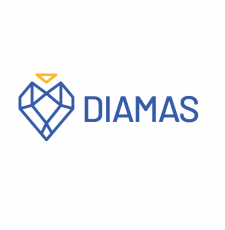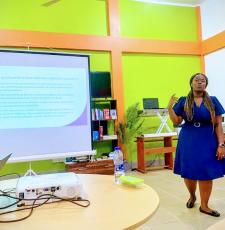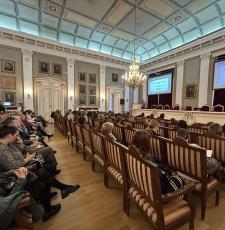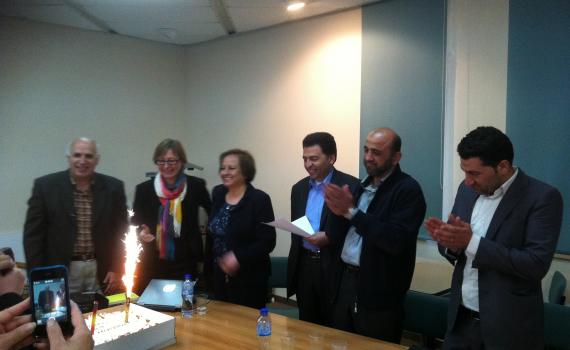
This year the Palestine Library and Information Consortium (PALICO) marks their 10th anniversary.
Members have organised a series of events to pay homage to many years of successful participation in EIFL programmes.
EIFL Director Rima Kupryte joined PALICO in Birzeit on May 4, 2015, to highlight the occasion.
Celebrations will also include a workshop on Intellectual Property Rights, celebrating Open Access Week in both West Bank and Gaza, and marketing campaigns for the use of e-resources provided through EIFL by each consortium member institution.
“Ten years ago EIFL reached out to us with a helping hand,” says Diana Sayej Naser, Palestinian Library and Information Consortium (PALICO) member and EIFL Country Coordinator.
“This grew into a strong partnership that has benefited education and research in Palestine,” she continued.
“I am also personally proud to be a member of the EIFL Advisory Board, contributing to building partnerships with other countries across the developing world, in need now as we were 10 years ago,” she says.
PALICO is first born
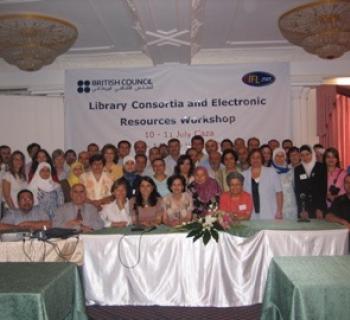 2005 consortium building workshop in Ramallah.PALICO took its first steps in April 2005 when three representatives from the Committee of Academic Libraries were invited to participate in the EIFL Middle East kick-off meeting in Cairo.
2005 consortium building workshop in Ramallah.PALICO took its first steps in April 2005 when three representatives from the Committee of Academic Libraries were invited to participate in the EIFL Middle East kick-off meeting in Cairo.
In July 2005, EIFL held two consortium building workshops in Palestine – in Gaza and Ramallah, to help academic libraries build and manage their own sustainable consortium.
“I have very vivid memories of my first visit to Gaza and West Bank," remembers Rima Kupryte.
“There was so much energy. During that meeting the baby was born - the group agreed on the name Palestinian Library and Information Consortium (PALICO). I was so pleased to see that no matter of political challenges, the library community stayed together for those 10 years.”
Promptly, in September 2005 a Steering Committee of 15 members from both parts of the country was formed to draft the consortium bye-laws.
Since then, PALICO has grown from nine institutions in 2015 to now 16 university, college and polytechnic libraries that offer e-journals, e-books and databases to its academic clientele, thereby making an essential contribution to education and research in Palestine.
The early years
What may seem a fairly normal course of development for many EIFL library consortia, is nevertheless a special challenge in Palestine (given the volatile political and social situation over the years) and the geographical division the consortium has had to overcome, with members in both West Bank and Gaza.
Before the consortium existed, there was no access to e-resources due to the high prices of subscriptions, and users had to depend solely on a limited range of printed materials.
Thanks to EIFL’s central negotiations, PALICO was able to start with access to five e-resources in 2005 provided by the publishers free of charge.
This range has expanded to other free and paid for resources (in English and Arabic) and consortium members run a lively awareness raising and training programme on the use of these resources for students and faculty.
Of equal importance, libraries now have a dedicated budget for online licences, a major result of joint advocacy by consortium members.
PALICO has established itself as a reputable professional body with the Ministry of Higher Education, that has recognised the importance of the consortium’s work to provide access to quality information for education and research, by allocating special funds for e-resource subscriptions in 2014 and 2015.
 PALICO members in front of Birzeit University Library in 2015.
PALICO members in front of Birzeit University Library in 2015.
Overcoming political and social challenges
Major challenges remain, however.
The geographical barrier between members of the consortium in Gaza and West Bank is making it more difficult to hold face to face meetings, training sessions, discussions.
PALICO is addressing this challenge by arranging video links between West Bank and Gaza, which unfortunately often fail due to regular electricity cuts in Gaza.
Budget cuts imposed on institutions of Higher Education in the wake of the global financial crisis are another serious challenge to the effective working of consortium member libraries.
A specific challenge for the consortium is to raise awareness and to advocate for a revised copyright law that meets the needs of libraries in Palestine today.
Looking forward
Notwithstanding these challenges, PALICO is full of plans for its future activities.
Most prominently, to build closer relations with the Dean’s Research Council at the Ministry of Higher Education and to convince the ministry to find funds for subscription to more databases in English and Arabic.
Another focus will be to explore closer working relationships with the major public libraries in Palestine.
We wish them continued success in the years ahead.
SHARE / PRINT






